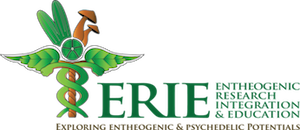To understand research in the field of psychedelic medicine, it is necessary to define the terms used. The history of uninformed attack on mind-expanding substances in the 1970s resulted in the use of terminology with negative connotations. We compare the relevant terms used, so readers can understand the dialogue of this developing, leading-edge research.

“Entheogen” was first defined in The Road to Eleusis (1978) by Wasson, Hofmann, and Ruck. Ruck proposed “a new term that would be appropriate for describing states of shamanic and ecstatic possession induced by ingestion of mind-altering drugs” (p. 139). “Entheogen” is meant to address the aspects of these medicines that cause shamanic, indigenous cultures to consider them sacred.
Ruck felt the Greek word entheos was appropriate because it means “the god within” and referred to ecstatic possession, prophetic seizure, erotic passion, or the transport of creative artistic states; while the root gen denotes the act of becoming; so the combination means “entering a state of inspiration,” and variations on that theme. Its strict use would refer only to “vision-producing drugs that can be shown to have figured in shamanic or religious rites”. A looser construal may include “other drugs, both natural and artificial, that induce alterations of consciousness similar to those documented for ritual ingestion of traditional entheogens” (p. 139). Entheogens have the pragmatic value to primary cultures of providing visionary cosmology, enhancing one’s comprehension of the world, and facilitating healing; this is why they have earned the adjective “sacred” and are still in use after thousands of years. Psychology has focused mainly on aberrant mental states and behavior, so Wasson et al. wished to avoid labels for sacred substance derived from the root “psycho”—such as “psychotomimetic,” which implies that these substances induce psychosis—due to negative associations arising from the chaos of the 1960s and the ensuing government disinformation campaign.

The term “hallucinogen” implies that visions experienced under the influence of psychedelics are illusory and meaningless. Dr. Humphrey Osmond, the American physician who coined the word “psychedelic” in 1957 because the root “psyche” is anomalous, hoped it would convey “reveals the soul” instead of mental delusion. Dr. Timothy Leary and graduate student Ralph Metzner of Harvard were partly responsible for its popularization in the counter-cultural revolution forty-five years ago, after they had some success in treating alcoholism with LSD, and due to Dr. Leary’s positive personal experiences. But “the Establishment,” or entrenched powers, reacted to the wave of rebellion and liberation characterizing the simultaneous emergence of the psychedelic revolution, the sexual revolution, and the civil rights movement with a propaganda campaign that defamed psychedelic use with inaccurate, sometimes totally false, often hysterical misinformation.

Ruck did not feel that shamans taking sacred medicine in a solemn ceremony for the purpose of healing or guidance should be seen as taking a “psychedelic” substance, with its negative popular connotations.
William A. Richards (2002) emphasized that these substances had been used “in the context of religious ceremonies” for more than 2000 years by cultures where they were considered sacred (p. 144). He, too, prefers the term entheogen and quotes Brother David Stendl-Rast (2001) as saying that entheogens might be best understood as “sacramentals—a manifestation of nature…through which faith encounters God’s power”; or we might say, “the divine.”
Entheogenic researchers at ERIE prefer to not use the term “drugs,” which refers only to physical effects resulting from their use. Entheogens do produce physical effects, but these are incidental to the purpose for taking them. Entheogens are used for their broad-spectrum, psycho-emotional amplification and introspective properties, not for their physiological effects.
*Article reposted from ERIE’s issue of the CIIS Cambio 2012*
Adrian Auler, MA, Ph.D. candidate in transpersonal psychology. This is more than a profession to me; it is a spiritual path, a way of being in the world. The aspect of psychology in which I’m most interested is consciousness studies. Two subsets of that focus that are central to my dissertation are entheogens (psychedelics) and addiction. Integration is important too because it is necessary in order to benefit fully from transpersonal experiences. I strongly feel that integral philosophy is the core principle defining the new paradigm. I pay attention to the philosophical implications of my psychological stance so it reflects what I have learned about the cosmos and our position in it. My focus on addiction and its treatment with entheogens is a portal through which I support the revolution of paradigm that is already underway.
